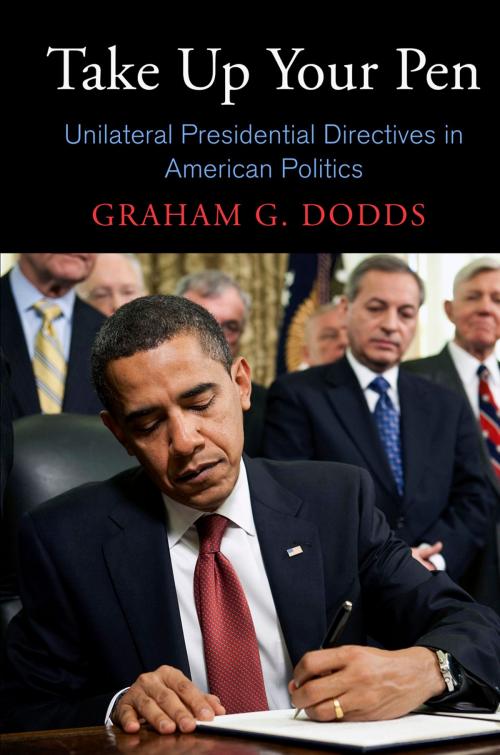Take Up Your Pen
Unilateral Presidential Directives in American Politics
Nonfiction, Social & Cultural Studies, Political Science, Government, Public Affairs & Administration| Author: | Graham G. Dodds | ISBN: | 9780812208153 |
| Publisher: | University of Pennsylvania Press, Inc. | Publication: | April 22, 2013 |
| Imprint: | University of Pennsylvania Press | Language: | English |
| Author: | Graham G. Dodds |
| ISBN: | 9780812208153 |
| Publisher: | University of Pennsylvania Press, Inc. |
| Publication: | April 22, 2013 |
| Imprint: | University of Pennsylvania Press |
| Language: | English |
Executive orders and proclamations afford presidents an independent means of controlling a wide range of activities in the federal government—yet they are not mentioned in the U.S. Constitution. In fact, the controversial edicts known as universal presidential directives seem to violate the separation of powers by enabling the commander-in-chief to bypass Congress and enact his own policy preferences. As Clinton White House counsel Paul Begala remarked on the numerous executive orders signed by the president during his second term: "Stroke of the pen. Law of the land. Kinda cool."
Although public awareness of unilateral presidential directives has been growing over the last decade—sparked in part by Barack Obama's use of executive orders and presidential memoranda to reverse many of his predecessor's policies as well as by the number of unilateral directives George W. Bush promulgated for the "War on Terror"—Graham G. Dodds reminds us that not only has every single president issued executive orders, such orders have figured in many of the most significant episodes in American political history. In Take Up Your Pen, Dodds offers one of the first historical treatments of this executive prerogative and explores the source of this authority; how executive orders were legitimized, accepted, and routinized; and what impact presidential directives have had on our understanding of the presidency, American politics, and political development. By tracing the rise of a more activist central government—first advanced in the Progressive Era by Theodore Roosevelt—Dodds illustrates the growing use of these directives throughout a succession of presidencies. More important, Take Up Your Pen questions how unilateral presidential directives fit the conception of democracy and the needs of American citizens.
Executive orders and proclamations afford presidents an independent means of controlling a wide range of activities in the federal government—yet they are not mentioned in the U.S. Constitution. In fact, the controversial edicts known as universal presidential directives seem to violate the separation of powers by enabling the commander-in-chief to bypass Congress and enact his own policy preferences. As Clinton White House counsel Paul Begala remarked on the numerous executive orders signed by the president during his second term: "Stroke of the pen. Law of the land. Kinda cool."
Although public awareness of unilateral presidential directives has been growing over the last decade—sparked in part by Barack Obama's use of executive orders and presidential memoranda to reverse many of his predecessor's policies as well as by the number of unilateral directives George W. Bush promulgated for the "War on Terror"—Graham G. Dodds reminds us that not only has every single president issued executive orders, such orders have figured in many of the most significant episodes in American political history. In Take Up Your Pen, Dodds offers one of the first historical treatments of this executive prerogative and explores the source of this authority; how executive orders were legitimized, accepted, and routinized; and what impact presidential directives have had on our understanding of the presidency, American politics, and political development. By tracing the rise of a more activist central government—first advanced in the Progressive Era by Theodore Roosevelt—Dodds illustrates the growing use of these directives throughout a succession of presidencies. More important, Take Up Your Pen questions how unilateral presidential directives fit the conception of democracy and the needs of American citizens.















